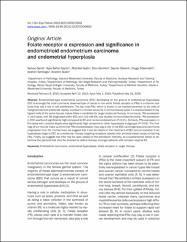| dc.contributor.author | Şenol, Serkan | |
| dc.contributor.author | Ceyran, Ayşe Bahar | |
| dc.contributor.author | Aydın, Abdullah | |
| dc.contributor.author | Zemheri, Ebru | |
| dc.contributor.author | Özkanlı, Şeyma | |
| dc.contributor.author | Kösemetin, Duygu | |
| dc.contributor.author | Şehitoğlu, İbrahim | |
| dc.contributor.author | Akalın, İbrahim | |
| dc.date.accessioned | 2020-12-19T19:58:25Z | |
| dc.date.available | 2020-12-19T19:58:25Z | |
| dc.date.issued | 2015 | |
| dc.identifier.citation | Senol, S., Ceyran, A. B., Aydin, A., Zemheri, E., Ozkanli, S., Kösemetin, D., Sehitoglu, I., & Akalin, I. (2015). Folate receptor α expression and significance in endometrioid endometrium carcinoma and endometrial hyperplasia. International journal of clinical and experimental pathology, 8(5), 5633–5641. | en_US |
| dc.identifier.issn | 1936-2625 | |
| dc.identifier.uri | https://hdl.handle.net/11436/2962 | |
| dc.description | Akalin, Ibrahim/0000-0002-7487-4603 | en_US |
| dc.description | WOS: 000358370300156 | en_US |
| dc.description | PubMed: 26191275 | en_US |
| dc.description.abstract | Endometrioid-type endometrial carcinoma (EEC) developing on the ground of endometrial hyperplasia (EH) is amongst the most commonly observed type of cancer in the world. Folate receptor alpha (FR alpha) is a vitamin molecule that has a role in cell proliferation. the fact that FR alpha, which is known to be needed extremely by the cells of malignancies that proliferate rapidly, is present in limited amounts in normal tissues while it is overexpressed in malignant cells of the same tissues makes folate a candidate for target molecular therapy. in our study, FR alpha expression in 214 cases, with 95 diagnosed within EEC and 119 with EH, was studied immunohistochemically. FR alpha expression in EEC was found significantly high compared to EH and normal endometrium (P<0.01). Similarly, FR alpha expression in EH cases with complex atypia were significantly high compared to other hyperplasia subgroups (P<0.01). the findings of our results make us think that FR alpha overexpression may play a role in the EEC carcinogenesis and carcinoma progression from EH. Furthermore, we suggest that it can be helpful in the treatment of EEC and/or transition from hyperplasia stage to EEC as a molecular therapy targeting receptors labeled with antibody-based props containing FR alpha. Finally, we suggest that FR alpha may be used, based on the expression intensity, as a supplemental option to determine the patients that shall be directed to radical therapy amongst patients with complex atypical EH. | en_US |
| dc.description.sponsorship | Istanbul Medeniyet UniversityIstanbul Medeniyet University [TSA-2013-401] | en_US |
| dc.description.sponsorship | This study was supported by Research Fund of Istanbul Medeniyet University (Project Number: TSA-2013-401). | en_US |
| dc.language.iso | eng | en_US |
| dc.publisher | E-Century Publishing Corp | en_US |
| dc.rights | info:eu-repo/semantics/closedAccess | en_US |
| dc.subject | Endometrial carcinoma | en_US |
| dc.subject | Endometrial hyperplasia | en_US |
| dc.subject | Folate receptor alpha | en_US |
| dc.subject | Target therapy | en_US |
| dc.title | Folate receptor alpha expression and significance in endometrioid endometrium carcinoma and endometrial hyperplasia | en_US |
| dc.type | article | en_US |
| dc.contributor.department | RTEÜ, Tıp Fakültesi, Cerrahi Tıp Bilimleri Bölümü | en_US |
| dc.contributor.institutionauthor | Şehitoğlu, İbrahim | |
| dc.identifier.volume | 8 | en_US |
| dc.identifier.issue | 5 | en_US |
| dc.identifier.startpage | 5633 | en_US |
| dc.identifier.endpage | 5641 | en_US |
| dc.relation.journal | International Journal of Clinical and Experimental Pathology | en_US |
| dc.relation.publicationcategory | Makale - Uluslararası Hakemli Dergi - Kurum Öğretim Elemanı | en_US |


















